Boston Terrier Itchy Skin [Ultimate Guide]
When your Boston Terrier starts scratching, you want to know why. Is it fleas, just an itch, or something else?
Why does my Boston Terrier itch? Boston Terrier itchy skin is caused by allergies, insect bites, infections, or a regular skin itch. Allergies are environmental or dietary. Bites can include fleas. Yeast infections are the most common infection in Boston Terriers.
Let’s be very clear; I’m not a veterinarian. I’m just a dog dad to two Boston Terriers and have had to learn from our vet, and trial and error, how to deal with their itchy skin, mild infections, and allergies.
If your dog has itchy skin, rashes, or other concerning conditions for prolonged periods, you should see a vet immediately. Maybe it’s a dog itching allergy.
No matter where your Boston Terrier’s itch is, we’ve covered all the bases. What causes the irritation, how to help the itch and how to prevent it in the future.
Let’s get into it.
What causes a Boston Terrier’s itchy skin or back?
When it comes to a dog’s itch, there are four primary causes:
- Allergy
- Bite/Sting
- Infection
- Just an itch
But, how can I tell the difference?
Boston Terrier Allergies
Boston Terriers are known to have a hypersensitive immune system.
That means they can show intolerance to many environmental allergens, foods, or medications.
The most common causes of allergies in Boston Terriers are:
- Pollens (tree, grass, weed)
- Molds
- Shampoos and Conditioners
- Foods (wheat, soy, or gluten)
- Medications (certain antibiotics, pain reducers)
- Aerosols / Perfumes
- Smoke / Vape
- Latex
- Dust mites
- Human Dander (Right?!?!?!?!)
Allergies tend to show up first on a Boston Terrier’s skin in the form of redness, rash, hives, and flaky skin.
This type of issue tends to start around the ears, belly, and legs.
You may notice that your Boston Terrier licks or chews at a specific area frequently.
If you go to the vet, they may use the term Atopic Dermatitis. That is a term meaning a pruritic (itchy) skin disease typically caused by an allergen sensitivity. In other words, an allergy that shows itself on the skin.
Atopic Dermatitis presents itself as red, flaky, itchy skin. If not treated, it can lead to a secondary skin infection. These secondary infections can cause skin thickening and hair loss.
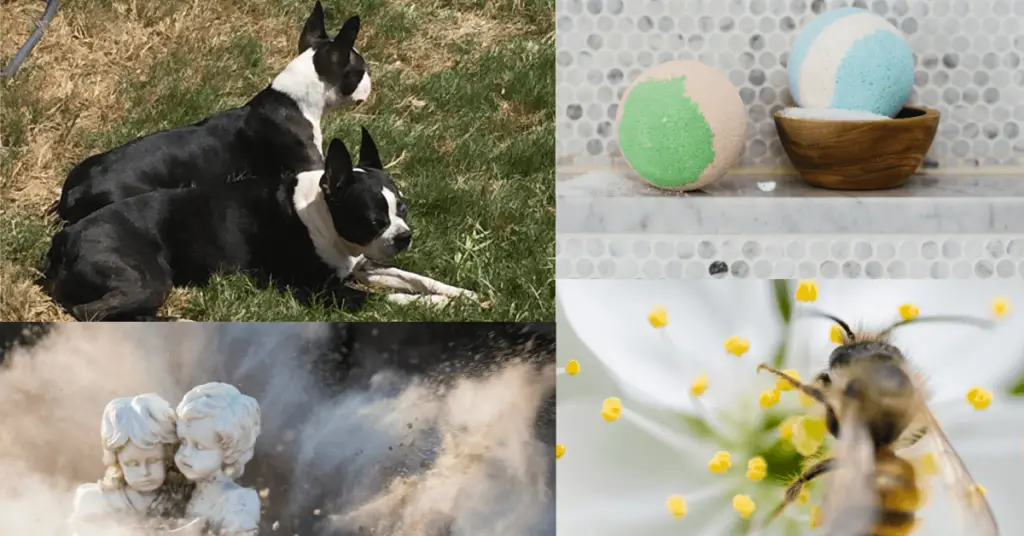
Bites and Stings With Itchy Skin
Face it, when your dog spends time outside, it comes in contact with many small critters, including the biting and stinging kind.
When a Boston Terrier is stung by a wasp, hornet, or bee, you’ll usually hear their yelp and see their reaction. The sting site may form a localized welp that is red and swollen.
There is an allergic reaction that occurs with the venom of the sting. It will itch, and you will likely observe your dog scratching or pawing at the sting.
While only a small percentage of dogs have an anaphylactic shock response to a sting, it is always good to monitor your Boston’s breathing and watch for any signs of distress for a few hours after a sting. Take them to a vet immediately if you have any concerns.
At home, you can apply ice to the sting site at 10-minute intervals to help reduce swelling.
Another home treatment is to make a paste of baking soda and water and apply it to the sting site.
Infections Can Cause Itchy Skin or Back
Like it or not, Boston Terriers are susceptible to both bacterial and viral infections.
When it comes to itchy skin, we are referring to yeast infections. We are not talking about the friendly beer-making kind, but the microscopic fungus that is not good for dogs or humans.
Dogs usually have these fungi present, however, Boston Terriers seem to have a common overgrowth of them.
A yeast infection is typically an indicator that something else is wrong. That something is an allergic reaction to an allergen. These infections may also point to other immune system issues.
A Boston Terrier with a yeast infection may have red, irritated, flaky, or greasy skin. In severe cases, hair loss may occur. The typical areas to look at are the skin, paws, and ears.
You can help prevent itchy skin due to yeast infections by using antifungal wipes and shampoos with effective ingredients including chlorhexidine, miconazole, and ketoconazole.
When is an Itch just an Itch?
Sometimes we all just have an itch. Boston Terriers are no different.
What do you do if you have an itch? You rub or scratch it briefly. Once that resolves the issue, you go back to what you were doing.
The same is true for your Boston Terrier. An occasional scratch may be nothing more than that.
When you notice frequent, repeated scratching or gnawing in the same area over and over again, it is likely something that needs more attention.
Let your dog scratch the occasional itch. Just pay attention to how often and where.
Boston Terrier Itchy Ears
Has your Boston Terrier been itching and rubbing its ears constantly? Chances are they either have a bite causing the itch or a yeast infection in their ears.
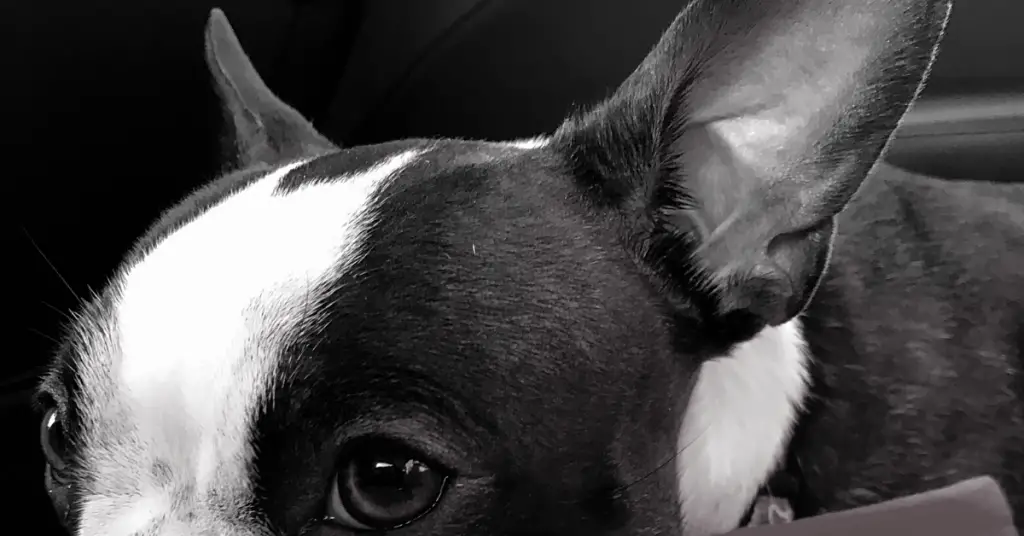
What causes itchy ears
The two most common causes of itchy ears in your dog are an insect bite or a yeast infection.
Insect bites or stings will be detectable by one or more red bumps. In some cases, the area of the bump may feel warmer than the surrounding skin.
Now, if you place your nose in your dog’s ear and smell something that is odd and a bit sweet, that is likely a yeast infection.
Ear mites are a final potential cause of itchy ears.
How to help itchy ears
Bites – Treat with a medicated shampoo or a baking soda and water paste. Don’t get any of it in their ears!
Yeast Infection – One of our Bostons, Bridgette, gets these periodically. After working with our vet on the first few, we are now confident to treat them early and easily with Zymox at home.
Ear mites can show similar symptoms to a yeast infection. A dark, waxy, or crusty discharge from the ear may indicate ear mites. Beware! Ear mites are highly contagious to other animals.
Your vet can quickly determine if ear mites are at work so take your Boston in if you suspect ear mites.
How to prevent itchy ears
Be sure to clean your Boston’s ears on a regular basis. Whether you do this yourself or have a groomer do it, clean ears are less likely to get yeast infections.
Of course, there are exceptions to the rule like our Bridgette.
Boston Terrier Itchy Eyes
Is your Boston pawing at its eyes or rubbing its face on soft things?
Let’s see what might be causing this.
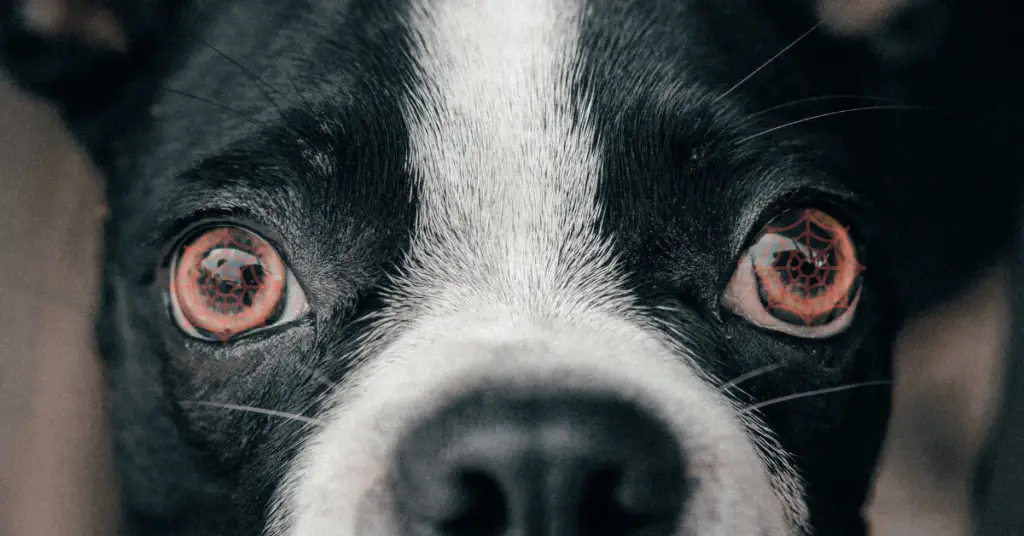
What causes itchy eyes
Itchy, watery, red eyes can be caused by a number of things including:
- Allergies
- Foreign objects
- Chemical irritant
How to help itchy eyes
Look, we won’t mess around here. If there is a significant issue with your Boston’s eyes, we recommend going to the vet.
If you see crusty eyes, pupils that are uneven, eye color changes, or cloudy eyes, it could indicate a condition that requires medical intervention.
While it may just be allergies and a diet change will help, other more severe issues could be at fault.
If it is a foreign object, the vet is best to address this without causing permanent damage.
How to prevent itchy eyes
Be careful if you are mowing, trimming, or using a leaf blower while your dog is near you. They are lower to the ground which means they are at the same level as this machinery when it throws debris.
Boston Terrier Itchy Face
Is your Boston Terrier scratching its face on your carpet or rug frequently? We don’t mean in the fun playful ways our beloved Bostons do. Instead, we mean do they do it often, beyond playtime, and seem to be trying to get relief from it?
It could be an indication of an inhalant allergy, insect bites, or skin infection.
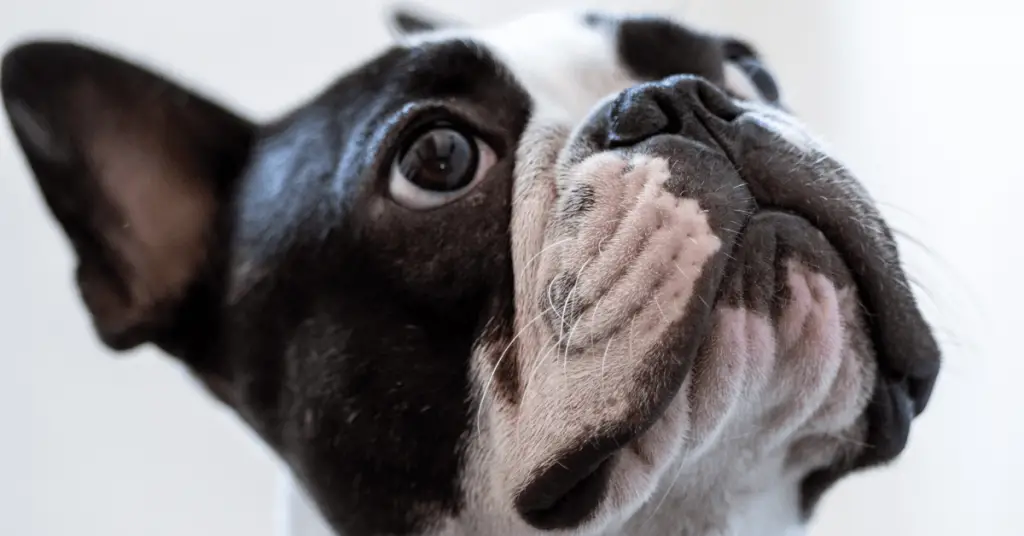
What causes an itchy face
The face of a Boston Terrier is sensitive. A Boston’s short snout means they are less able to keep large allergens out.
Insect bites or stings can certainly cause a dog to scratch and wipe its face vigorously. Look for red bumps that would should insect bites.
Bostons will also itch their face if something they inhaled is causing an allergic reaction. Did you just spray hand sanitizer on your hands and immediately reach to pet your dog? How about the Febreeze you just sprayed to get rid of the doggy smell?
Although less usual, a yeast infection could be the culprit.
How to help an itchy face
Bites – Treat with a medicated shampoo if flea bites or a baking soda and water paste if a sting or singular bite. Keep it out of the eyes! Backing soda is abrasive and can cause eye damage!
Yeast Infection – While less common on the face, use antifungal wipes and shampoos.
For an inhalant allergy, move your Boston to a different room or outside depending on where you think the inhaled irritant is located.
How to prevent itchy face
Prevention of bites and stings is difficult. Observation is key. Yards might need a dog-friendly insecticide to keep fleas and ticks at bay.
Yeast infections continue to be most effectively treated, if not severe, by bathing your Boston monthly and using antifungal wipes and shampoos.
Prevent inhalant allergies is tricky. If your dog seems more affected indoors, Stop using all aerosol sprays, candles, body sprays, perfumes, and anything else that is atomized in the air.
If after two weeks your dog is no experiencing the problem, reintroduce one item at a time. Just one item every week and see how your Boston reacts. You are trying to isolate what thing is causing the problem and eliminate it permanently.
Boston Terrier Itchy Paws / Feet
Constant licking or chewing of the paws is a classic sign of allergy or infection.
It is not uncommon for food allergies to cause the paws to itch. Although it could be a yeast infection.
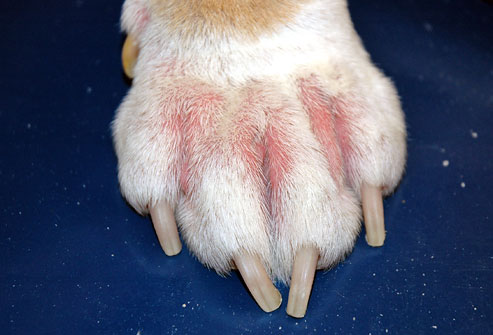
What causes itchy paws
As we’ve said, Boston Terriers are prone to yeast infections and the paws are no exception.
Some owners say that the paws smell like Fritos or Doritos when their Boston has a yeast infection on the paws.
At the same time, in many dog breeds, chewing of the paws on an ongoing basis may be a sign of a food allergy.
How to help itchy paws
If you are dealing with a yeast infection, it is recommended to use antifungal wipes and shampoos. Just be sure they include one of the effective ingredients, chlorhexidine, miconazole, and ketoconazole.
A food allergy will take longer to help. If your dog food is not already a limited ingredient diet type food, try a new one that is.
We like Natural Balance L.I.D. Salmon and Sweet Potato, but there are lots of options. You are looking for a food that has very few ingredients, no ingredients you don’t recognize, and does not have corn, wheat, or soy.
Over a week or two, gradually increase the mixture of new dog food to old so that you eventually are only using the new dog food. This will help your Boston’s stomach adjust.
Give it a month or so and see if the itchy paws go away.
How to prevent itchy paws
If the itchy paws are caused by a food allergy, changing their diet until resolved is the best prevention. See your vet about specific allergy testing if a limited ingredient diet doesn’t do the trick.
If a yeast infection was the cause of itchy paws, there are a few tips to prevent it from coming back.
- Use antifungal wipes to clean your Boston’s paws regularly.
- Dry the paws to keep them from remaining moist for any long periods of time.
- Use antifungal shampoo when bathing your Boston.
Boston Terrier Itchy Butt/Tail
Now, when it comes to an itchy butt or tail, dogs are a bit different.
Signs that your Boston has an itchy butt or tail:
- Constant licking of their rear. More than the typical.
- Scooting their butt across the floor.
- Rotating flat on their butt like on a sit-n-spin.
What causes itchy butt or tail
The three most common causes of itchy rears are:
- Fleas
- Worms
- Anal Gland (sac) issues.
How to help itchy butt or tail
If you see red bumps, these may be flea bites. It’s time for a medicated flea bath or a visit to your vet.
Worms are typically not actually visible externally without looking at excrement. If you’re not sure, take your pup to the vet for a test. You don’t want to mess around with this one as worms can cause sickness and death.
If worms are the issue, the vet will provide a medication that will clear them up quickly and easily.
Compacted anal glands can cause discomfort for your Boston. The action of pressing their bum against the floor may help unclog these glands.
Until this can be resolved, periodic warm compresses may help ease the discomfort.
Many times, it is necessary to have the anal glands expressed. Your groomer can do this or teach you. Be careful!
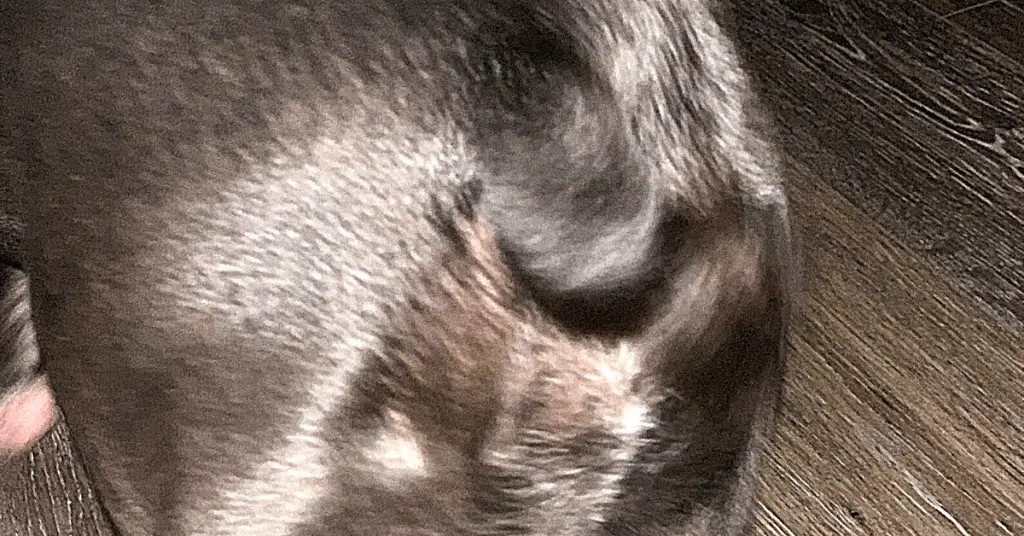
How to prevent itchy butt or tail
Preventing fleas may require an internal medication now available or an external prevention treatment.
Worms can come from a variety of sources. If you have a dog that eats excrement, fix that issue through reward training and diet changes. Be sure your Boston is on a worm preventative prescribed by your veterinarian.
When you bathe your Boston, be sure to not neglect its rear end. You can also use a washcloth with warm water as a compress a few times during a bath to help.
Some owners swear by the use of natural gland helping remedies like PetAlive AnalGlandz.
Can dogs be tested for allergies?
Yes, dogs can be tested for allergies. It is not inexpensive but if you want to know precisely what your dog is allergic to, this is an option.
Your dog will have a rectangle patch of fur shaved off in order to create a spot to do the tests.
Most allergy tests include testing for environmental and food allergies. These typically include testing for weeds, grasses, trees, human dander, corn, wheat, and many more.
Products Mentioned to Treat Boston Terrier Itch
Here are the products we’ve referred to above that can help in treating various causes of Boston Terrier itchy skin.
- Zymox Ear Enzymatic Solution
- PetAlive AnalGlandz
- BEXLEY LABS Curaseb Chlorhexidine Wipes
- Curaseb Antifungal & Antibacterial Chlorhexidine Spray for Dogs & Cats
- Curaseb Chlorhexidine 4% Antibacterial & Antimicrobial Medicated Shampoo
- K9 Advantix II Flea and Tick Prevention for Medium Dogs
Related Questions
How often should a Boston Terrier be bathed? Unless your dog gets especially dirty, you should bathe your Boston Terrier every 4-6 weeks.
How do I soothe my dog’s itchy skin? There are some natural home remedies that do not have scientific backing but dog owners swear by. We always recommend an oatmeal bath as a common method of assistance. Coconut oil is a natural disinfectant and can be rubbed into a dry itch spot on the skin.

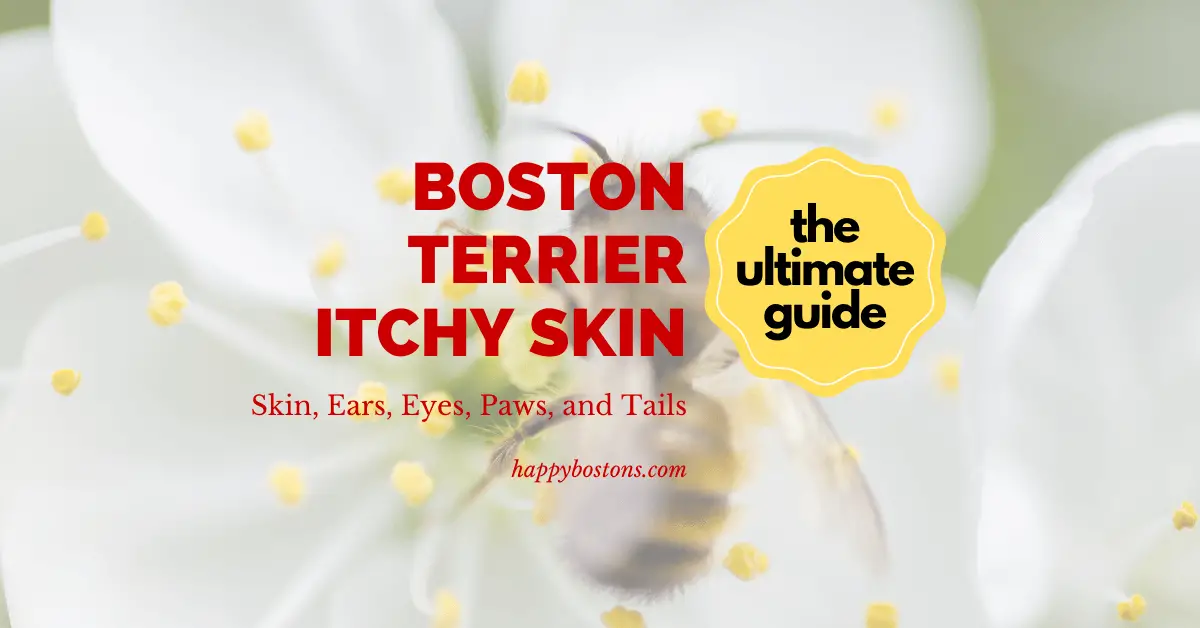





![Vet Costs For A Sick Dog [Real Life Bills]](https://happybostons.com/wp-content/uploads/2021/12/Vet-Costs-For-a-Sick-Dog-Boston-Terrier-Tiny-768x402.jpg)